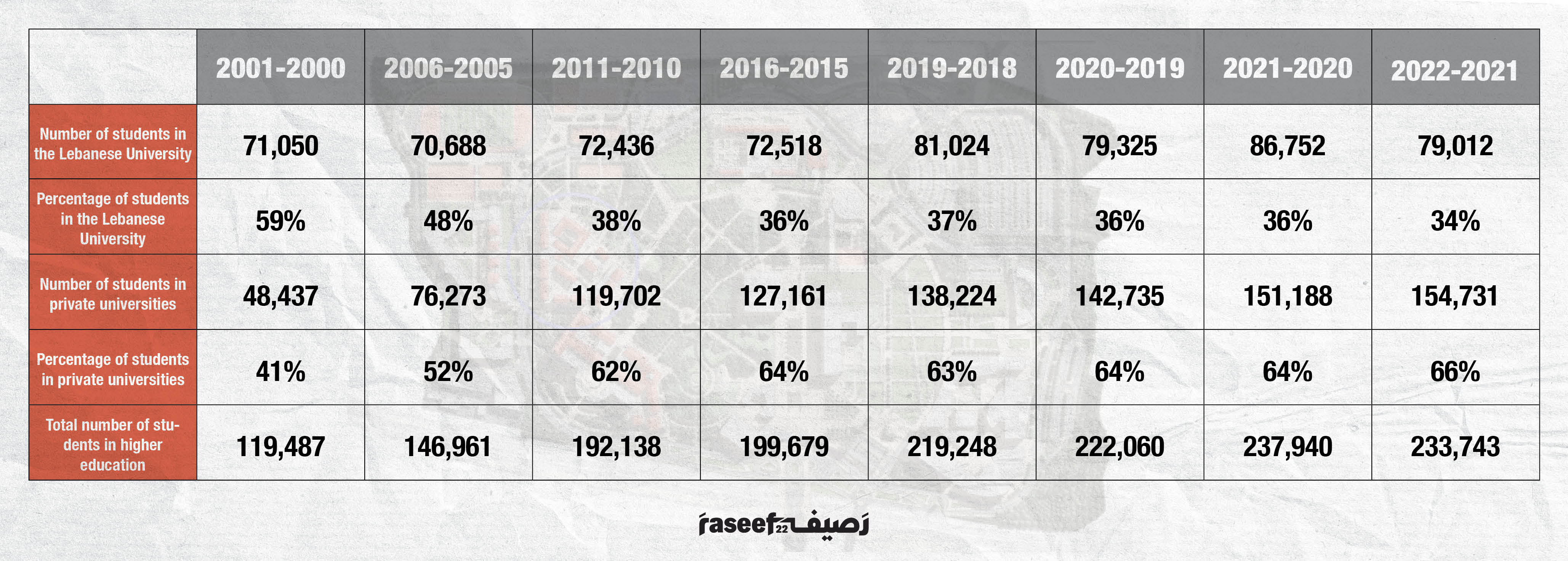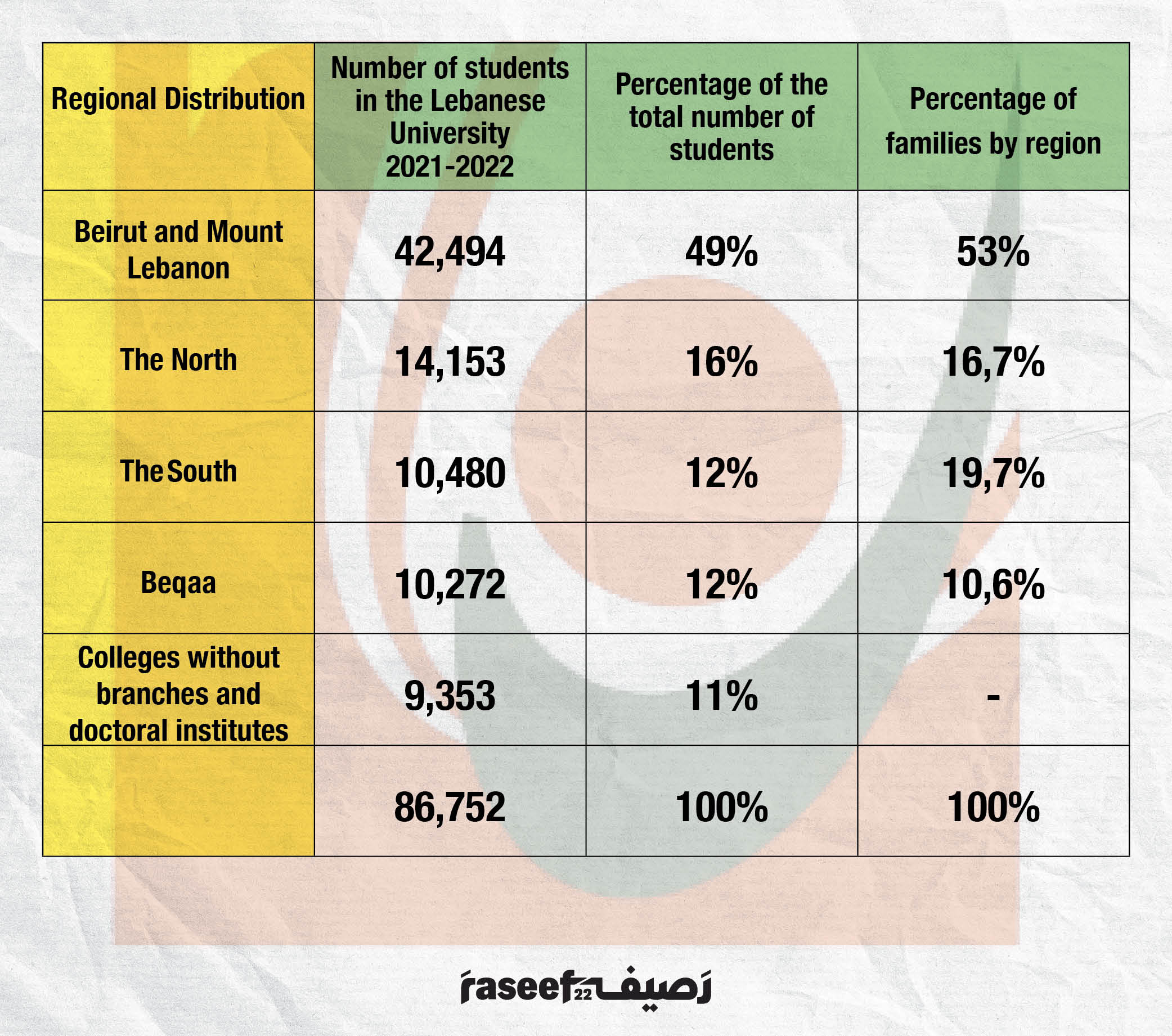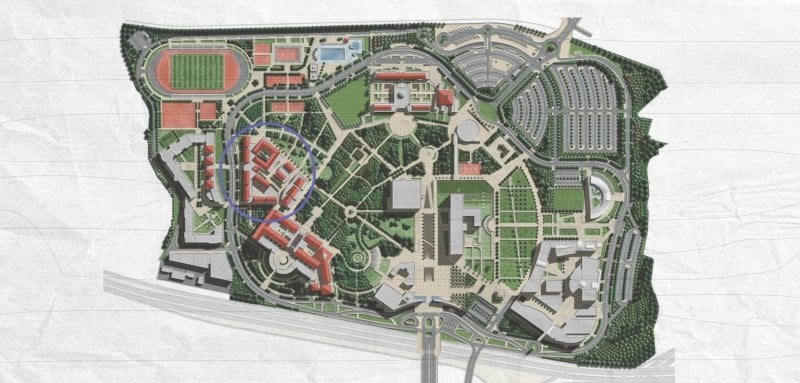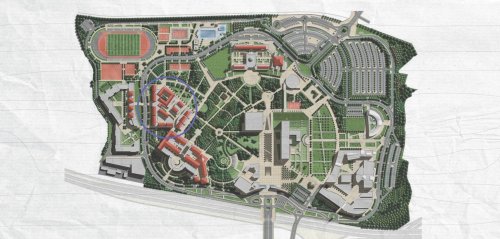The current student movements at the Lebanese University can best be described as incredibly timid and reserved, especially in comparison to what the Lebanese University currently faces. Professors take to social media to express their grievances and complaints, as the Lebanese University (LU) is embroiled in a serious conspiracy. Neither the student movement, the Association of Full-time Professors, nor the movement of contract professors, are up to par with what is happening, or are able to adequately address the ongoing issues.
About a month ago, three students from the Lebanese University submitted a petition to the State Shura Council to annul the decision to increase university registration fees by more than tenfold, as proposed by the Minister of Finance in the caretaker government, Yusuf al-Khalil, and the Minister of Higher Education, Abbas Halabi.
This petition was initiated by the General Student Union in collaboration with the Legal Agenda, who argued that the increase contradicts both previous budget laws and laws regulating the Lebanese University.
In recent years, the Lebanese University has witnessed a noticeable decline across the board due to the interference of political parties in all its aspects, and its policy of favoritism over competence in hiring for administrative positions, from deanship to the smallest details, which has further exacerbated the multitude of existing problems. The economic crisis has further accelerated the deterioration and collapse of the institution.
The crisis is profound, and higher education in Lebanon is not faring well. Private universities, which are often described as ‘supermarkets’, have also been affected. This article focuses on the Lebanese University, we will cover private universities in a later report.
Fluctuating student numbers at the Lebanese University
Statistical data on higher education in Lebanon since 2000 points to a significant increase in the number of students at both the Lebanese University and private universities. The number of students enrolled in institutes of higher education increased by 96% from 2001 to 2022, from 119,487 to 233,743 students.
The Lebanese University maintained a student body of around 70,000 students between 2001 and 2015. Since 2015, the number of students increased by 24%, reaching 86,752 in 2021. However, this growth was short-lived, and enrollment gradually declined, reaching 64,794 students in 2023, according to unpublished official information we have obtained from the university. This indicates a 25% decrease in the student body, a loss of 21,958 students in two years.
The decline in enrollment at LU isn't due to a deterioration in the quality of education. It appears to be a consequence of a conspiracy against it since the mid-1990s, with “deliberate and calculated” media campaigns seeking to tarnish the institution’s image
Taking into account total enrollment in higher education, the decline in student enrollment at the Lebanese University began over two decades ago. After peaking at 59% in 2001, it dropped to 34% by 2022. In contrast, the percentage of students enrolling in private universities increased from 41% in 2001 to 66% in 2022.
It must be noted that the decline in enrollment at the Lebanese University is not due to a deterioration in the quality of education. Instead, it appears to be a consequence of a ‘conspiracy’ against it, through policies adopted by successive governments since the mid-1990s, in addition to the “deliberate and calculated” annual media campaigns that seek to tarnish the institution’s image within society, and amongst students and their families.
 The number and percentages of students enrolled at the Lebanese University and at private universities
The number and percentages of students enrolled at the Lebanese University and at private universities
How was the conspiracy against the national university carried out?
In the mid-1990s, under the neoliberal policies adopted by governments, including policies to restructure state institutions, successive governments employed a dual strategy designed to weaken the Lebanese University. They paved the way for licenses for private universities in Lebanon, of which there are now a total of 52. They also encroached upon the powers of the Lebanese University Council through Resolution 42/1997, which partially transferred academic authority from the University Council to the Cabinet.
The detrimental repercussions of these policies for the Lebanese University can be summarized in four points:
Firstly, political authority seized control of the process of granting tenures, or full-time positions, to the teaching staff at the university. This is contrary to the university’s Organization Law and academic standards; the decision to grant tenures is regulated by Article 37 of the University Organization Law of 1967, which mandates the tenure of contract professors after two years, based on the department councils' needs and a decision by the university council, without involving professors' files and dragging them into sectarian political rivalry, as is currently happening.
Over the past two decades, only two batches of professors have been granted tenure: the first in 2008, involving around 800 professors, and the second in 2014, including around 1,200 professors. Approximately 120 professors retire annually, indicating that the university currently needs to give full-time positions to at least 1,680 professors to compensate for the loss due to retirements.
It is worth noting that the decision to grant professors tenure in 2014 contributed to the regularization of academic work, the establishment of specialized master's programs, and the revitalization of research centers. As a result, partnerships were formed with foreign universities, and some master's programs became joint ventures with international institutions. This collaboration strengthened the academic staff and improved the quality of education at the university, consequently leading to an improvement in its scientific ranking. Job prospects for its students also opened up.
Since 2014, the Lebanese University has lost many of its professors. Despite this, the political authority persists in weakening the institution and striking at its academic staff. Council powers have not been restored, and no decision has been made to fill the vacancies and reassign the professors whose names have been submitted to the General Secretariat of the Cabinet. For the last five years, the political authority has refused to place the university's file on the Cabinet's agenda.
For the sake of comparison, the annual budget of the Lebanese American University stands at around $181 million, a staggering 24 times more than the budget allocated to the Lebanese University, but with 8,400 students, 9 times less than the student body of LU
The failure to strengthen the academic staff at the Lebanese University has compromised academic standards. Currently, 69% of professors are employed on an hourly basis, well beyond the stipulated limit of 20% as per the university's regulations.
There are a total number of 4,800 professors at the University, 1,500 of which hold permanent positions, and the remaining 3,300 are contracted on an hourly basis. 1,500 are fully engaged in teaching, therefore making it their right, and the university’s obligation, to grant them tenure.
Secondly, the failure to appoint deans in the Cabinet due to sectarian power struggles and disputes over quotas, especially in major faculties, has paralyzed the university council for over 16 years in a 20-year period. Naturally, this has hindered the council's ability to develop the university, as the tasks of all acting deans are limited to managing their faculties, without the ability to implement improvements.
Thirdly, the university budget has been frozen at 400 billion Lebanese pounds annually (equivalent to $265 million USD), despite the collapse of the Lebanese lira. This sum, and its lack of adjustment, does not address the growing need for development at the university.
Moreover, the government increased the operational expenses for all public administrations by tenfold in its 2022 budget. The Lebanese University was not included in this increase. If not for certain demands raised in the parliamentary council, the budget would have been cut by 97%, to the equivalent of $7.5 million. By comparison, the annual budget of the Lebanese American University is approximately $181 million, a staggering 24 times more than the budget allocated to the Lebanese University. The former has a student body of 8,400 students, nine times less than that of the Lebanese University.
The persistent refusal to amend the Lebanese University's budget, despite the local economic crisis, reflects a systemic policy of undermining the institution, causing it to slowly collapse, and forcing many of its professors and students to leave and seek alternatives. University professors’ monthly salaries amount to $63 (according to the exchange rate). With the recent aid and productivity allowances, it reaches approximately $450. Hourly-contracted professors, the majority, with an annual workload of up to 350 hours, received a converted salary in the summer of 2023 amounting to $308 annually, approximately $25 monthly.
This harsh reality has led over 30% of university faculty to temporarily stop teaching, either taking their seventh-year leave, unpaid leave, freezing their tenure, or terminating contracts in order to join private universities in Lebanon and abroad.
Finally, the government and political authority has failed to pressure airlines to redirect funds for PCR tests, a right belonging to the Lebanese University. These funds, in excess of six times the university's budget, could play a vital role in sustaining the university's operations in the near future.
These four points highlight how the government is mishandling the Lebanese University. They affirm that the university is not experiencing a 'crisis', and that there is no systematic plan underway to bring university operations to a halt, in service of private, sectarian and commercial, higher education in Lebanon.
What interest do some private universities have in weakening the Lebanese University?
The law regulating higher education in Lebanon stipulates that 50% of the teaching body should hold Phds at the bachelor's level, 70% at the master's level, and 100% at the doctoral level. Due to the excessive and disproportionate number of private universities in Lebanon, which has reached 52, the availability of university professors. Therefore, the majority of private universities rely on assigning a significant portion of undergraduate education to professors with master's degrees. They also hire a considerable number of Ph.D. holders from the Lebanese University on an hourly contract basis for both master's and doctoral levels. Consequently, most private universities have no interest in endorsing the tenure process at the Lebanese University, for fear of losing the professors they are reliant on. These universities, predominantly through their political lobbying and influence within the government, stand against the decision to grant professors tenure which would consequently revitalize the national university.
The persistent refusal to amend the Lebanese University's budget, despite the economic crisis, reflects a systemic policy of undermining the institution, causing it to slowly collapse, and forcing many professors and students to leave and seek alternatives
In addition to all of this, the Lebanese University faces ‘calculated’ media campaigns at the beginning of each academic year, intended to tarnish its image. Various forces, including some private universities, contribute to these campaigns. Their goal is to instill anxiety amongst university students and their families, and ultimately drive them towards sectarian or politically-affiliated private universities, which, for their part, offer enticing deals with no regard for the quality of education.
Why undermine and weaken the Lebanese University?
Since before the establishment of Lebanon, sectarian academic institutions have played a fundamental role in the educational landscape at all levels and stages, and have competed to make education part of the sectarian and political identity for various groups. The majority of universities in Lebanon were either established by foreign missions or by sectarian religious entities.
However, the Lebanese University emerged as a result of a socio-economic and national demand, separate from sectarian divisions. Since its inception, the Lebanese University has not merely been an educational institution, but a consistent national entity in service to the local community. It has historically contributed to providing quality education for broad social groups, bringing about societal transformations and enabling marginalized communities to gain access to more influential positions. Social advancement and the creation of the middle class would not have been possible without the higher education provided by the Lebanese University.
 Regional distribution of students across Lebanese University branches
Regional distribution of students across Lebanese University branches
The distribution of branches of the Lebanese University by governorate reflects its unique position as the sole provider of higher education meeting the needs of all Lebanese citizens, without exception. The distribution of its students across provinces aligns with the distribution of the population in Lebanon, therefore earning it the title of ‘university of the nation’.
Because of its national identity and role in societal transformation and equity, which does not align with sectarian and divisive interests, efforts have been made to undermine and weaken the Lebanese University.
In conclusion, it must be emphasized that saving the Lebanese University is not just a demand of its community, but rather a necessity for Lebanese society. It can play a pivotal role in navigating Lebanon out of its current collapse.
The continued economic collapse, the migration of young talent, and the collapse of the national educational sector, especially the Lebanese University, will have catastrophic consequences for the country.
Today, more than ever, the national university can be a leader in overcoming challenges. Without this university and its nurturing of young talent, there is no possibility of local revival or advancement.
Not long ago, the demand to restore the university council's powers was for the university community alone. However, today, regaining these powers and granting tenure to hourly-based professors have become priorities for the entirety of Lebanese society, and hold a crucial role in the plan to lift Lebanon from the collapse it is currently experiencing.
Raseef22 is a not for profit entity. Our focus is on quality journalism. Every contribution to the NasRaseef membership goes directly towards journalism production. We stand independent, not accepting corporate sponsorships, sponsored content or political funding.
Support our mission to keep Raseef22 available to all readers by clicking here!
Interested in writing with us? Check our pitch process here!









